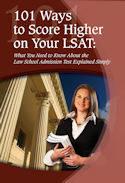Pete left me this comment and I wanted to answer his question so more people could benefit from the response:
"Do you have any tips for older folks (30+) who are still working their way through their undergrad degrees on applying to law school? As an evening student with a full-time job, I don't have the same opportunity to build relationships through "face time" with my professors that more "traditional" students have. (Usually everyone's ready to go when class ends at 10PM, the professor included!) I'm sure all hope is not lost, but what alternatives are there?"
First of all, understand that your efforts to get your degree are well appreciated by law schools. They understand that it takes self-financing and additional motivation and hard work to complete a degree while working full time.
Also, a lot of traditional college students suffer from the same lack of "face time" with faculty. It's not just you. You need to think about what else you bring to the table - is there someone from work? A supervisor, a client, a vendor who can speak to your accomplishments and abilities? A community service organization that you've served? Also, remember it's not too late to get to know a professor. If you did well in a class, call up that professor and see if he/she can meet you for coffee and get to know you and whether he/she would be willing to write a letter on your behalf based on your classroom performance.
Your situation is not unique, and law schools are prepared for it. It should help to know that Letters of Rec are the least important area of your application (unless they are terrible, then you are in trouble)....
P.S. The comment below is from a former client, currently attending U. of Florida School of Law. I solicited his input because it sounds like he and Pete are/were in similar circumstances.
Thursday, July 26, 2007
LOR Tips for Non-Traditional Applicants
Posted by
Ann K. Levine, Esq.
at
1:10 PM
![]()
Labels: Letters of Rec, Non-Traditional Applicants
Subscribe to:
Post Comments (Atom)


I went back to school full-time at age 27 while working a full time job and a second part-time job. . The class schedule was one five-hour night per week for 8 weeks. I took two classes a week to make a full-time schedule. That said, I had no issues getting letters of recommendation. Here are a few tips:
ReplyDelete1) Ask questions
Whether before class, during breaks, or immediately after class, asking questions will get you face time. I built practically all of my relationships with professors by asking questions and discussing class topics. Not all professors will want to spend this time with students, however, but my experience has been very positive with only 1 professor in a hurry to get out of class. My classes ended at 10:30 PM, and I had to be at work the next morning at 5 AM--I stayed anyway to ask questions--it was well worth it.
2) Schedule classes with professors you have had before
This just makes sense. The more time you spend with a professor, the more the two of you will become familiar with each other. I purposely took classes taught by deans and other administrative leaders to develop such relationships. Doing well in these courses will help ensure great recommendations.
3) Make time, if possible, to visit the administrative offices. I was always in the office to work out my degree plan, take CLEP tests, etc. When I saw a professor or dean I recognized, I would be sure to initiate polite conversation.
Can you give some tips on some major points the professor/recommender should state in the letter?
ReplyDeleteThanks,
Joe
I graduated in 2005 when I was 26. I worked before, during, and after college. I just completed a class at a local college that will help me with my logic skills. The professor said that he would be happy to write the recommendation letter, but I think he was unsure on what are the main points that should be conveyed in the letter for law school applications.
ReplyDeleteCan you give me some tips on the key points that that a recommender should write in the letter?
How many letters do you recommend is sufficient?
Would a letter from a supervisor at a non-profit that I volunteered at work?
The class I took was after I received my diploma, so will they factor the grade into my undergraduate gpa?
Thanks for your time-
Joseph
Hi Joe - I haven't used this blog in a while. Please see http://www.lawschoolexpert.com/blog
ReplyDeletePlease check there for more information about LORs. I also have a chapter about LORs in my book, "The Law School Admission Game: Play Like an Expert."